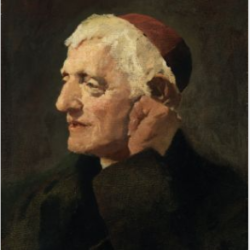
(Wikimedia CC; click to enlarge)
Compare Mark 16:14-18; John 14:23
1.
It’s difficult to imagine that “some doubted” even in the presence of the resurrected Lord. But the fact of death is so universally well known and so widely understood as definitive, and wishful thinking so generally understood to be a dangerous spur to error, that some still wondered whether it was all too good to be true. So much, I suppose, for the complacent modern notion that ancient people were credulous while we chronologically superior mortals are guided by pure, dispassionate reason.
2.
I’ve encountered some critics of Mormonism who’ve claimed that Christ’s promise to be with his disciples “alway, even unto the end of the world,” rules out the possibility of a universal apostasy. But the phrase translated by the King James as “even unto the end of the world” is ἕως τῆς συντελείας τοῦ αἰῶνος, and that last word, αἰῶν (compare English eon or aeon) could just as easily be rendered as “age” or “period” or, even, I suppose, “dispensation.” So Jesus could have been saying that he would be with them “to the close of the age” or “until the completion of the age,” or “until the close of the dispensation.”















